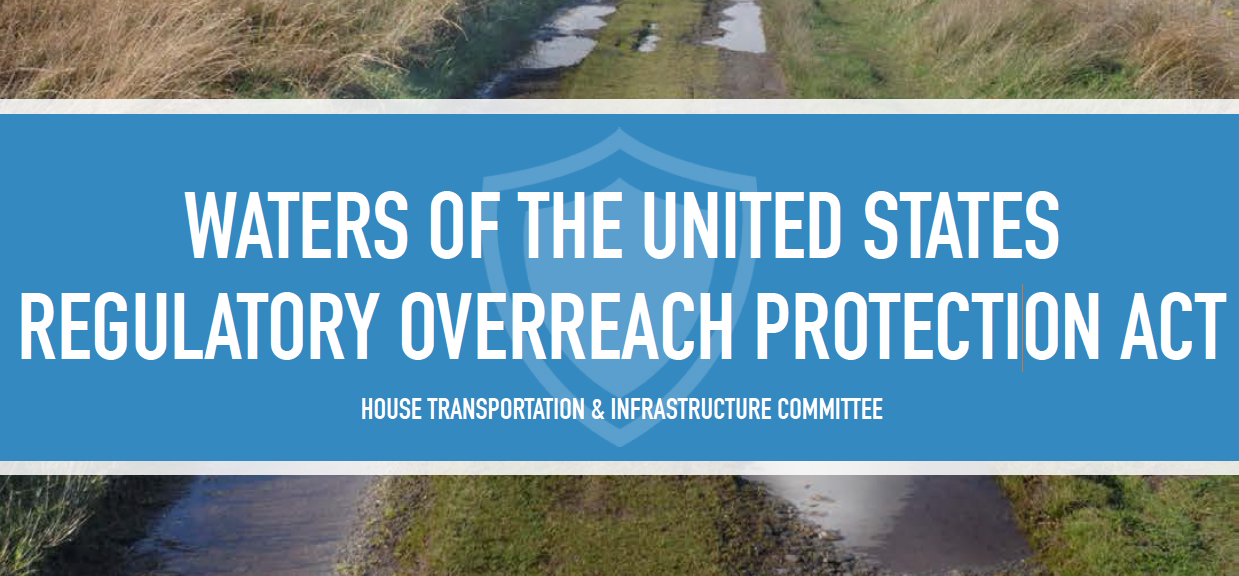Press Releases
Legislation to Prevent Federal Overreach in Regulation of Nation’s Waters Introduced by Committee LeadersBill to be Considered at Committee Markup Next Week Bipartisan legislation to uphold the federal-state partnership to regulate the Nation’s waters and prohibit the Environmental Protection Agency and the Army Corps of Engineers from implementing a rule that broadens the scope of the Clean Water Act and expands the federal government’s regulatory power was introduced in the House today by Transportation and Infrastructure Committee leaders. The Waters of the United States Regulatory Overreach Protection Act (H.R. 5078) is sponsored by U.S. Rep. Steve Southerland, and is cosponsored by Transportation Committee Chairman Bill Shuster (R-PA), Water Resources and Environment Subcommittee Chairman Bob Gibbs (R-OH), and a bipartisan group of additional Members of the House. A Committee markup scheduled for 10:00 a.m., Wednesday, July 16, 2014 will include H.R. 5078. Bipartisan legislation to uphold the federal-state partnership to regulate the Nation’s waters and prohibit the Environmental Protection Agency and the Army Corps of Engineers from implementing a rule that broadens the scope of the Clean Water Act and expands the federal government’s regulatory power was introduced in the House today by Transportation and Infrastructure Committee leaders. The Waters of the United States Regulatory Overreach Protection Act (H.R. 5078) is sponsored by U.S. Rep. Steve Southerland, and is cosponsored by Transportation Committee Chairman Bill Shuster (R-PA), Water Resources and Environment Subcommittee Chairman Bob Gibbs (R-OH), and a bipartisan group of additional Members of the House. A Committee markup scheduled for 10:00 a.m., Wednesday, July 16, 2014 will include H.R. 5078.  Click above for more information “This bipartisan legislation provides a safeguard against the federal government’s overreach into regulatory decisions best made by officials at the state and local levels,” Southerland said. “By getting Washington out of the way, we’re also providing our farmers, manufacturers, transportation builders, and construction industries with the certainty they need to grow America’s economy, free from the regulatory burden of D.C. bureaucrats.” “Regulation of the Nation’s waters must be done in a manner that responsibly protects the environment, without an unnecessary and costly expansion of the federal government,” Shuster said. “This bill ensures that we can continue to protect our waters without unreasonable and burdensome regulations on our businesses, farmers, and families.” “During committee hearings held on this issue many stakeholders expressed their concerns about the tremendous uncertainty this rule would bring,” Gibbs said. “It has also been made clear the rule would have sweeping economic and regulatory implications for the entire Nation and undermine the ability of states and local governments to make decisions about their lands and waters. This legislation will ensure that our Nation’s waters are regulated responsibly by preserving the role of the states in administering the Clean Water Act.” For more than four decades, regulation of pollution and water quality for the Nation’s waters has been achieved through a productive partnership between state governments and the federal government. This relationship, established under the Clean Water Act (CWA), has been successful because of the recognition that not all waters need to be subject to federal jurisdiction and that states should have the primary responsibility of regulating waters within their individual boundaries. This partnership has led to significantly less pollution and cleaner water for the country. However, the Obama Administration and some lawmakers in recent years have sought to “clarify” the scope of federal jurisdiction under the CWA in a manner that would upset this balanced regulatory approach and expand the federal government’s power. Changing the scope of the CWA is solely the responsibility of Congress, and Congress has determined this to be unnecessary. Efforts to significantly expand federal jurisdiction was the subject of failed legislation in the 110th and 111th Congresses. Now, through a new rule proposed in April, the Obama Administration has sought to bypass the legislative process and achieve the same expansionist agenda through agency guidance and the executive branch’s regulatory process. H.R. 5078 addresses what is yet another example of a disturbing pattern of an imperial presidency that seeks to use brute force and executive action while ignoring Congress. The Waters of the United States Regulatory Overreach Protection Act The Waters of the United States Regulatory Overreach Protection Act will uphold the federal-state partnership to regulate the Nation’s waters by preserving existing rights and responsibilities with respect to “waters of the United States” under the Clean Water Act. The bill prohibits the Environmental Protection Agency and the Army Corps of Engineers from developing, finalizing, adopting, implementing, applying, administering, or enforcing:
The bill also requires the EPA and the Corps to engage in a federalism consultation with the states and local governments by:
# # # |






